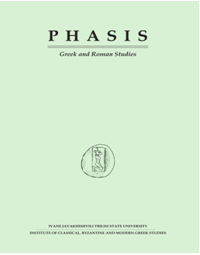
About the Journal
Founded in 1999, Phasis is published annually by the Institute of Classical, Byzantine and Modern Greek Studies of the Ivane Javakhishvili Tbilisi State University.
Phasis publishes original contributions in all areas of Greek and Roman Studies, including literature, history, languages, philosophy, religion, art, and archaeology. The journal also welcomes submissions on the reception of the ancient world. Phasis accepts articles in English, German, and French.
In 2015, Phasis became a peer-reviewed journal. Phasis has been included in the European Reference Index for the Humanities and Social Sciences (ERIH PLUS) since November 2020 and has been indexed in Scopus since September 2024. The journal is available in both print and electronic versions.
Publication Ethics and Publication Malpractice Statement
Phasis adheres to the guidelines of the Committee on Publication Ethics (COPE).
Editorial Responsibilities
The editor-in-chief and editorial board members make all editorial decisions on the basis of the manuscript's quality and double-blind peer review.
The editors will take appropriate measures to prevent the publication of manuscripts where research misconduct (e.g., plagiarism, citation manipulation, data falsification and/or fabrication) has been detected. If the editors are notified of allegations of research misconduct relating to a published article, they will handle the allegations according to COPE guidelines.
Peer Review Process: After an article is submitted to the journal, the editors screen the article and decide whether it should be rejected immediately or sent for peer review. If the decision is to review, the article is sent to two anonymous external reviewers, not affiliated with the same institution as any of the authors or editors. The journal follows a double-blind peer review process, where both the referee and author remain anonymous throughout the review process. The review process normally takes two to four months. After all referee reports are received, the manuscript is re-assessed by the editors. If the two reviewers disagree, the editor-in-chief may make a decision on publication or choose to send the article to a third reviewer. The reports along with the decision letter are sent to the author. At this stage, the decision may be one of the following: (a) accept, (b) accept with revisions, (c) major revisions needed and re-submission and re-review required, or (d) reject.
Confidentiality and Conflicts of Interests: Information about a submitted manuscript must not be disclosed to anyone other than the author(s), editors, reviewers, or the publisher, as required. Editors will not use unpublished materials disclosed in a submitted manuscript in their own research without the author(s)’ written consent. Editors will avoid judging manuscripts that conflict with their own interests. When reviewing an article submitted by editorial board members of Phasis, they will be excluded from the review process. The whole editorial decision-making process will be handled by other editors with decision-making responsibility.
Reviewer Responsibilities
Peer review assists the editor-in-chief/editorial board members in reaching editorial decisions and may also help the author improve the submission.
Confidentiality and Conflicts of Interest: Manuscripts received for review must be treated as confidential documents. Reviewers will not use unpublished materials disclosed in a submitted manuscript in their own research without the author(s)’ written consent. Reviewers will avoid reviewing manuscripts in which they have any conflicts of interest.
Author Responsibilities
Authors should only submit original work that has not been published previously or is not under consideration for publication elsewhere. Authors should properly acknowledge, cite, and quote the work of others.
Authorship of a manuscript should be limited to those persons who have contributed substantially to the conception, design, conduct, analysis, and interpretation of the study. The corresponding author must ensure that all co-authors approve the final manuscript before it is submitted for publication.
Authors should disclose any conflicts of interest or funding sources.
If authors discover significant errors in a published work, they should notify the editor as soon as possible and work with the editors to retract or correct the paper.
Open Access Policy
This journal provides immediate open access to its content on the principle that making research freely available to the public supports a greater global exchange of knowledge.

